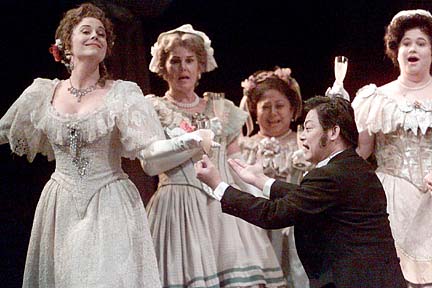


|
Theater puts new twist "La Traviata" may have flopped its first night, but it has had a remarkable rate of success ever since. Audiences love the story, which is almost foolproof: a young, beautiful and noble-hearted courtesan finds true love, only to die in the arms of her lover (sigh...).
on ‘La Traviata’
The opera changes in intriguing
ways when seen through the eyes
of a different characterBy Ruth O. Bingham
Special to the Star-BulletinOnce considered scandalous, the story is now almost cliché, folding back on itself in layers of self-references. Finding new approaches is an increasingly difficult challenge.
Hawaii Opera Theatre opened its 2002 season with a new twist to "La Traviata", directed by Michael Cavanagh and co-produced with Edmonton Opera and Calgary Opera.
Cavanagh repositioned "La Traviata" as a reminiscence, not by the courtesan Violetta, as in Zeffirelli's film version, but by her lover Alfredo, now an old man. In a mute role played by Woody Chock, the old man sat near the edge of the stage, occasionally wandering through scenes.
Alfredo's memories changed "La Traviata" in intriguing ways, but the audience did not always make the connections: that the white masked chorus seemed as ghosts from his past; that he saw the chorus's departure from Violetta's salon as black-caped, cold-hearted desertion of her when she was ill; that when the chorus censured his treatment of Violetta, it seemed to him as though they were "throwing" comments at him; and so on.
Despite some miscalculations (making Violetta sink in shame twice in a row, inserting an unnecessary reference to HOT's upcoming "Carmen", creating a startlingly spry death scene), much of Cavanagh's staging worked well, such as having the women in the chorus sink down to their knees in sympathy with Violetta, or having the chorus shift position in slow motion.
Repeats at 4 p.m. today and 7:30 p.m. Tuesday at Neal Blaisdell Concert Hall. Tickets $27 to $95. Discounts for students. 'La Traviata'
Whatever the approach, however, the success of "La Traviata" rests on the main character, and Violetta is a difficult role because it demands not only a wide range and great stamina, but also three different voices: a light coloratura in Act I, a passionate lyric in Act II, and an ethereal, crystalline voice in Act III.
Robin Follman, who performed Violetta, was a lyric soprano with a large voice, good control and clear, forward placement. The famous "Sempre libera" of Act I exposed difficulties in her highest range and in flexibility, but the main difficulty was that the aria did not suit her voice. The rest of the role, however, suited her very well, and Follman's Acts II and III offered numerous passages of depth and beauty.
Warren Mok (Alfredo), with his beautiful lyric tenor, matched Violetta at times, but often did not. Follman's voice was both brighter and markedly larger, forcing Mok to work much harder than suits the role.
Ping Yu (Giorgio Germont, Alfredo's father) embodied the dignified, reserved symbol of social convention that drives the plot. Yu turned out to be a delightful surprise, not just because he was a credible Alfredo's father (both singers are Asian), but because his voice matched both Follman's and Mok's.
Mezzo soprano Cynthia Ballentine (Flora) paired with bass-baritone John Mount (Marquis d'Obigny) to provide comic relief, another of Cavanagh's twists to the story. Ballentine and Mount acted and sang their parts well, and the comedy distinguished the characters more clearly than usual from the crowd of people on stage, but inserting buffo characters and slapstick antics (pushing furniture around and playacting matador, reminiscent of the style in HOT's "Barber of Seville") weakened the tragedy.
Tenor Eric Van Hoven portrayed a charming Gastone, and Patrick McNichols a sympathetic Doctor Grenvil. Quinn Kelsey (Baron Douphol), a young local singer, held his own among the more seasoned lead singers and showed much promise as a Verdian baritone.
Peter Dean Beck, HOT's resident set and lighting designer, rearranged large graduated French windows and potted plants on pedestals to suggest four different scenes, a simple but effective idea. Unfortunately, in the country house, the windows accidentally provided the audience in the balcony disconcerting reflections of the conductor and of Alfredo's back.
Conductor Michael Ching, himself an opera composer, wove voices and orchestra into a coherent whole, despite intermittent off-tempos or uninspired accompaniments. Lapses in balance occasionally pushed the lovers into oddly loud tenderness, but in general, Ching conducted with supple beats that breathed along with the singers.
Ruth O. Bingham is a free-lance writer who has a Ph.D. in musicology from Cornell University.